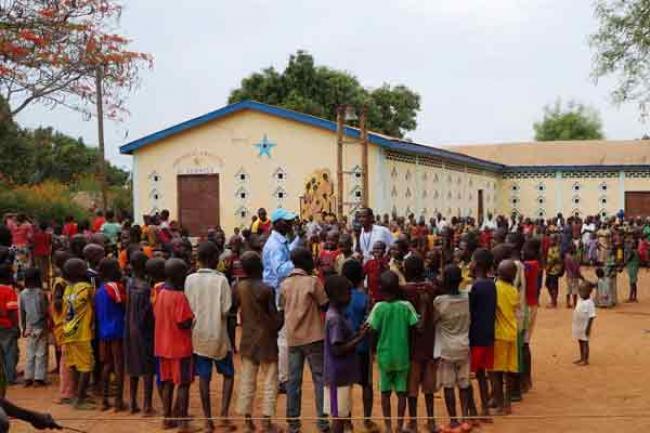Just Earth News 01 Feb 2017

UNICEF/Daniel Timme
The top United Nations relief official on Tuesday approved an allocation from the organization’s Central Emergency Response Fund (CERF) to support response to assist the response to new emergencies triggered by a surge of violence in the Central African Republic (CAR)’s Kaga Bandoro, Bambari and Bria areas.
The allocation, amounting to $6 million and allocated by the UN Emergency Relief Coordinator Stephen O’Brien on Tuesday, will enable the UN World Food Programme (WFP) to reach some 36,800 people facing food insecurity due to the crises in the last few months of 2016 that not only led to new displacements but also caused a significant decline in commercial activities in the areas.
“The humanitarian community is deeply concerned that a crisis linked to the scarcity and soaring prices of essential foodstuffs will aggravate a situation that is already extremely worrying,” warned Joseph Inganji, the head of the UN Office for Coordination of Humanitarian Affairs (OCHA) in CAR.
The CERF allocation, with approximately 3,600 tons of food, will meet urgent food needs for four months. In Bria and surrounding areas, located about 600 kilometres north-east of the national capital, Bangui, 12,800 affected people will receive assistance.
Similarly, about 10,000 people in Bambari, Grimari and the region (about 300 kilometres from Bangui), and 14,000 people in the Kaga Bandoro (some 330 kilometres from Bangui), will also benefit from the allocation.
According to OCHA, the CERF support will partially cover the urgent humanitarian needs of newly displaced people with regards to food security.
In addition to these funds, the Humanitarian Fund in CAR also triggered its emergency reserve mechanism on two occasions: first in December 2016 with $1 million to support the response to the food crisis in Bria; and then, in January 2017, it complementary addressed needs including shelter and non-food items, camp management, water, sanitation and hygiene, logistics, protection and health.
OCHA further noted that the humanitarian community in country continues to advocate for additional funds to cover the remaining needs.
CERF is one of the fastest and effective ways in which the UN supports rapid humanitarian response for people affected by natural disasters and conflict. The Fund receives voluntary contributions throughout the year to provide immediate funding for lifesaving humanitarian action anywhere in the world.
It is managed by the UN Emergency Relief Coordinator on behalf of the UN Secretary-General.
Yesterday, the Fund had allocated some $100 million to sustain operations in nine “neglected crises” around the globe, enabling life-saving assistance for more than six million people in Cameroon, the Democratic People's Republic of Korea, Libya, Madagascar, Mali, Niger, Nigeria, Somalia and Uganda.